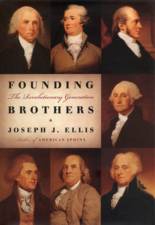

| Click on a book's image or title to order from Amazon.com |

Founding Brothers
Alfred A. Knopf, HC, © 2000, 278 pp, ISBN #0-375-40544-5Reviewed August 2002
Founding Brothers, subtitled "The Revolutionary Generation", is a collection of stories - not quite anecdotes, not quite event-by-event history - about the early days of the United States as a nation, from 1789 to 1826. It focuses on eight individuals crucial to the time: George Washington, John and Abigail Adams, Thomas Jefferson, James Madison, Alexander Hamilton, Aaron Burr, and Ben Franklin. Each of the six chapters focuses on an event or experience of these men, and explores how they came to that point, and how they dealt with the issues involved.
The first event is the fateful duel between Hamilton and Burr in 1804, in which Hamilton was killed and Burr essentially exiled to the west. Each man represented a particular mindset among the revolutionaries, with Hamilton being the staunch partisan Federalist wedded to his ideas of how government should work, and Burr the rank opportunist, nominally a Republican but more faithful to his own direct interests. Hamilton comes off as sympathetic here, seemingly at odds with his demeanor in later chapters (which occur earlier).
The second event involves the dinner thrown by Thomas Jefferson for Alexander Hamilton and James Madison during which the assumption of state war debts by the federal government was negotiated for Hamilton, seemingly in exchange for the choice of the Potomac location for the nation's capital. Of course, it was more complicated than that, as the capital choice was already essentially in the bag, whereas assumption was very much up in the air.
Third is the debate regarding slavery in Congress in 1790, precipitated by a petition from a group of Quakers. Nearly leading to southern secession (as it would 70 years later), this sensitive issue polarized the north and the south, and saw a variety of leaders electing to remain silent on the topic, judging that the survival of the nation was more important.
Fourth is the farewell speech (actually a letter printed in many newspapers) of George Washington in 1796, exploring the controversial decisions he made in office, his priorities for the nation, and just how revered a legend he was in his own time. Washington could make decisions no one else could make, because he was perhaps more popular than any other President in history.
Fifth is the collaboration between Jefferson and Madison during the Adams presidency from 1797-1800, and the collaboration of John and Abigail Adams in managing his presidency. Adams tried to keep to the Washington style of remaining above party politics, but this left him trapped between the declining Federalists and Jefferson's Republicans. Nonetheless, he scored some significant triumphs, and maintained key Washington policies during his term.
Finally, Jefferson and Adams had themselves been collaborators during the war, and slowly resumed their friendship from 1800 to 1826, as the last two major participants of the crucible. Their starkly different personal styles - Adams the fiery orator who could never organize his thoughts on paper, Jefferson the enigmatic thinker who saw everything aligning as he felt it should be - are contrasted, as well as their lengthy correspondence about the meaning of the revolution and the perception of the different sides in the government that it formed.
Founding Brothers is dense with information, but is clearly and entertainingly written; Ellis never loses sight of the fact that he has an audience to entertain and to educate. There are many recurring themes, including independence versus government authority (in a sense, the essential tension between the Declaration of Independence and the Constitution), the American revolution and the French revolution, and the present good versus the long-term good. Ellis isn't afraid to judge decisions he feels were errors, though he takes pains to point out that some events look very different in retrospect than they did to the participants at the time. Context is important, and Ellis works hard to provide it. Indeed, much of the book is context illuminating historic events.
Some of the figures - Franklin, Abigail Adams - are only peripherally explored, but Washington, John Adams, Jefferson and Hamilton come off as complex and layered individuals. I found Adams to be an especially compelling character, a man of strong convictions, caught in an impossible situation, and thereafter struggling to understand his place in history. His portrayal here left me interested in reading David McCullough's recent biography of the man.
A historical book with the feel of a series of short stories, Founding Brothers is terrifically entertaining and enlightening, and is a fine introduction for folks who want to learn more about this era in American history.
hits since 12 August 2002.